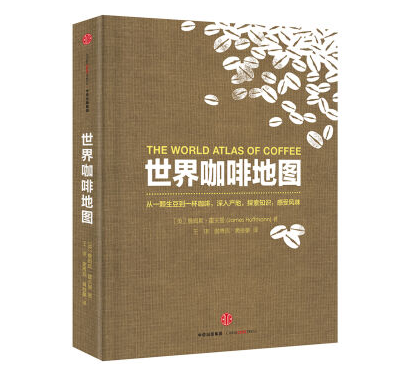The advance of coffee beginners: 3 steps to teach you how to taste a single cup of coffee?
Taste senses are actually a mixed sensory experience that combines many aspects of the body, such as taste, smell, touch, vision (studies have shown that vision can cause taste bias), and hearing (your taste senses are easily influenced subjectively by others). Although there are many authoritative criteria for measuring the quality of coffee, we have made some simplification on this basis in order to enable beginners to understand coffee more quickly. So to sum up, coffee beginners in tasting a cup of coffee, three steps, how to taste a single cup of coffee?

Step one: smell the incense
Dry aroma:: put the freshly ground coffee powder close to the mouth and nose, you will feel the dry aroma of different coffee from different coffee producing areas. For example, in Latin American coffee, you will smell something similar to nuts and dark chocolate, while coffee in Africa has more floral and fruit flavors.
Wet fragrance: pour the coffee into the cup, close your eyes and slowly smell its wet fragrance. You may smell nutty, chocolate, fruity or floral aromas.
Another major misunderstanding of human beings when tasting food is that the tongue cannot actually distinguish the smell, and only when the aroma of the food enters the nasal cavity can you fully perceive the taste of the food.
Inferior quality: industrial flavor, rotten smell, earthy taste, etc.
Quality: the aroma of coffee contains rich aromas such as wine, flowers and fruit, no matter the dry aroma of coffee powder or the wet fragrance after brewing, will bring you a sense of smell to enjoy.

Step two, taste the flavor.
When coffee is in your mouth, you can feel its flavor. In this respect, many enthusiasts, especially those who are just beginning to come into contact with coffee tasting, always think that coffee doesn't smell good. It is true that the sensory discrimination of coffee liquid in the mouth requires a certain amount of exercise, but over time, the flavor can be detected.
Another key point of tasting coffee is how to distinguish between sweet, salty, sour and bitter coffee.
Mellowness is what we usually call boby, which refers to the round, mellow and strong taste of the coffee liquid. The difference between a cup of water and a cup of coffee is that water is tasteless and not sticky, while espresso is rich in oil and has a good thickness. A cup of coffee with a good mellow thickness will make the aroma stay in the mouth longer and the finish longer.
Mellow feeling will not only affect your overall coffee experience, but also affect the integrity of the release of aromatic substances in coffee. Most cup testers or consumers can't tell which tastes are good and which are bad, but at least you know what you like and what you don't like. In my opinion, the judgment of the mellow taste of coffee varies from person to person.

[sweet]
Poor quality: balsam pear, too bitter
High quality: sweet, similar to sucrose, brown sugar, caramel, mouth full of feeling
Traits: coffee with sweetness is like a kind of fruit, which contains fructose in coffee beans, even if it is a cup of black coffee, there must be sweet taste behind the sour or bitter taste. In addition, according to the difference of coffee beans, there are different levels of coffee, there is no good or bad, only depends on personal preferences. But if the taste of Huigan is too dry, it means the quality of coffee beans is not good.
[cleanliness]
Poor quality: miscellaneous flavor
Excellent quality: pure and fresh taste
Traits: in fact, the astringency of coffee does not need to be eliminated, but needs to be suppressed, and the degree of inhibition is also different according to everyone's different preferences. The taste that is more messy or has bad negative taste is not enough to achieve net.
[bitter]
Poor quality: bitter at the root of the tongue, rough "bitter"
Excellent quality: as bitter as dark chocolate
Traits: there is no simple "bitter" in boutique coffee. Generally, we will use "bitter" to describe the nutty taste, dark chocolate flavor and caramel flavor.

[acid]
Inferior quality: humic acid, sharp acid, high acidity, smack lips, acetic acid
Quality: fruit acid, fresh acid, round acid, soft acid
Traits: "Sweet is easy, good sour is rare". The sour taste of high-quality coffee should be contained in the coffee, not obvious and sharp. High-quality coffee often contains a lot of organic acid substances, such as citrus, berries and other rich sour taste, the quality of acid is an important factor in fine coffee.
[salty]
Traits: in fact, there are many kinds of salty taste, and the aroma reminds people of salty food, such as the smell of too much salt in fried vegetables, and the smell at the bottom of the cup after drinking coffee, which smells salty. Think of salty snacks such as shrimp sticks and Wangxian shellfish, and so on. And the taste summed up is the taste of salt.
Usually do hand flushing and Italian style will occasionally taste and "smell" to [salty] (smell refers to the smell after grinding), and most of the time, the salty taste is more obvious in Espresso.
Due to the distribution of taste, sour and salty taste, it is easy to be confused, inferior acid and salty taste is difficult to distinguish. But it is different from the salty taste of salt after all. Of course, some beans have an unusually salty taste, which is very close to the salty taste of sea salt.

The third step is to perceive the aftertaste
The last point of tasting is Huigan. The so-called Huigan refers to the aftertaste of coffee in the mouth and throat. After drinking the coffee, there will always be a taste back from the throat, some of the aftertaste is very long and clear, some are very short and very vague. We say that a longer and clearer aftertaste is good, and the quality of raw coffee beans is higher.
The origin of individual coffee has different flavors, which is the charm that enables the coffee to develop continuously. Coffee from different producing areas has different flavors, making the coffee all over the world a big garden with rich taste.
[acid]

[honey] (water washing and light baking)
Recommended reason: Ethiopian water washing Sidamo G1 micro-batch
Palate: wild ginger, bergamot, blackcurrant, rich aromas of a variety of tropical fruits
Taobao password: https://item.taobao.com/item.htm?spm=a1z10.5006-c-s.newtejia.18.aW9oQy&id=539681992398

[Panamanian Flower Butterfly] 70% of Rosa rugosa
Recommended reason: Rosa content 70%, cost-effective
Palate: tea, honey, berries, classic jadeite manor Geisha
Taobao link:
Copy this message and open Mobile Taobao to see [Panamanian Poket Butterfly Coffee beans in Front Street contain 70% Rosa fresh Baking Powder] ¥5T9rniHAL1 ¥http://c.b1wt.com/h.eRnteA?cv=5T9rniHAL1&sm=d3dca4
[bitter]

[gold Manning, Sumatra, Indonesia]
Recommended reasons: mellow taste, yellow man's sweet and clean, mellow, wild spice flavor is slightly better than the G1, which is one of the reasons why yellow man is more expensive than the G1.
Palate: baked toast, nuts, pine, caramel, herbs
Taobao password:
Copy this message and open Mobile Taobao to see [Indonesia PWN gold Mantenin black coffee beans G1 washing imported single boutique fresh baking free delivery] ¥CA3FnirIaD
[sweet]

[Costa Rican black honey]
Recommended reason: high sweetness
Taste: plum, honey, brown sugar
Taobao link:
Copy this message and open Mobile Taobao to see [Costa Rican black honey treats boutique coffee beans of Faramy Manor in Kaduetara] ¥r5GVniIoAk ¥http://c.b1wt.com/h.eRNqOj?cv=r5GVniIoAk&sm=a75506

[candle] (slightly baked in the sun)
Recommend reason: the processing process is 90 + specialty, will separate these coffee according to variety, microclimate, fresh time one by one, taste one by one, specially design the processing method for each taste, achieve a kind of taste characteristic, just like the big-brand design, study hard and spend painstaking efforts to complete a handicraft that is close to art.
Palate: rich aromas of berries, flowers, grapes and a variety of tropical fruits
Taobao password:
Copy this message and open Mobile Taobao to see [Qianjie 90 + Candlestick Coffee beans, Sidamo Sun Coffee beans, imported roasted Fine Coffee Powder Free delivery] ¥bUF5l3gcD9

Finally, the most scientific method is:
Drink coffee,
Drink coffee,
And. Drink coffee!
Important Notice :
前街咖啡 FrontStreet Coffee has moved to new addredd:
FrontStreet Coffee Address: 315,Donghua East Road,GuangZhou
Tel:020 38364473
- Prev

Parsing | Why does the coffee we drink taste bitter?
There are two main factors for the bitterness of coffee: the roasting of coffee beans and the brewing of coffee. To the surprise of many people, coffee beans themselves are not bitter, here coffee beans refer to raw coffee beans. The bitterness of coffee beans is caused by the process of turning raw beans into ripe beans, that is, the roasting of coffee beans. Raw coffee beans contain a component called chlorogenic acid, which is produced by plants in response to environmental changes.
- Next

Coffee book recommendation: "World Coffee Map" the World Atlas of Coffee
English title: world Coffee Map original title: the World Atlas of Coffee author: James Hoffman (UK, James Hoffmann) Citic Publishing wrote in the front words: in this way, it is a 2014 book. At that time, I was attracted by the appearance and content of the book. I couldn't wait to write the impression after reading it. What I didn't know at that time was that thinking about it would reverberate. Two years
Related
- Beginners will see the "Coffee pull flower" guide!
- What is the difference between ice blog purified milk and ordinary milk coffee?
- Why is the Philippines the largest producer of crops in Liberia?
- For coffee extraction, should the fine powder be retained?
- How does extracted espresso fill pressed powder? How much strength does it take to press the powder?
- How to make jasmine cold extract coffee? Is the jasmine + latte good?
- Will this little toy really make the coffee taste better? How does Lily Drip affect coffee extraction?
- Will the action of slapping the filter cup also affect coffee extraction?
- What's the difference between powder-to-water ratio and powder-to-liquid ratio?
- What is the Ethiopian local species? What does it have to do with Heirloom native species?

